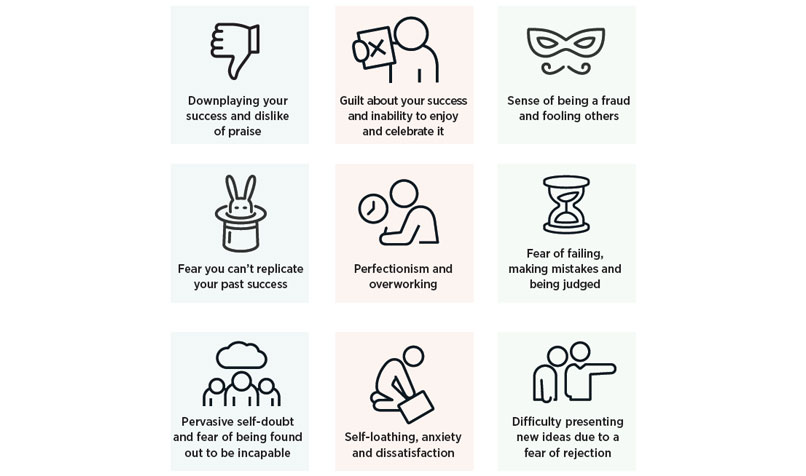Loading component...
At a glance
- Impostor syndrome is made up of a set of attitudes and behaviour that reflects a feeling of not being good enough despite successes and achievements.
- Low self-esteem is at the heart of impostor syndrome and, while it is not exclusive to any particular gender, ethnicity or age, underrepresented and marginalised groups are especially susceptible to it.
By Linda Moon
The “impostor phenomenon” was first identified in the 1970s, by psychologists Pauline Rose Clance and Suzanne Imes, who initially thought it was an anxiety unique to high-achieving women. Since then, wide-scale research has found impostor syndrome permeates our society at all levels, regardless of gender, ethnicity or age.
Organisational psychologist Clare Mann defines impostor syndrome as a persistent collection of attitudes, self-beliefs and behaviours with the overwhelming narrative of not feeling good enough, usually in the context of achievement or success.
Thoughts such as, “It must have been luck”, “I can’t really do this” or “I shouldn’t be here” are accompanied by a fear of being found out, negatively affecting our decision-making and stifling our potential and the joy we take in our work.
Impostor syndrome also makes us less likely to take chances at work, such as seeking a promotion, challenging ourselves or joining a peer group, Mann says.
How society shapes our insecurities
At the heart of impostor syndrome is low self-esteem, which can be undermined by subconsciously internalised sociological influences from childhood and life experiences, the media, relationships and social stereotyping, Mann says.
Research shows that underrepresented, marginalised and disadvantaged groups, including people from racial minorities and low-income backgrounds, for example, are especially susceptible to impostor syndrome.
Environments that champion extroverts may result in the less outgoing feeling inferior at school or at work, Mann adds. “So, people are often pretending to be extroverted,” she says. This contributes to that feeling of being a fake.

Rik Schnabel, mindset expert and author, has experienced it first-hand, when he was a successful advertising executive. Schnabel now works with other successful professionals, many of whom suffer from feeling like a fraud.
“They’re just waiting for that inevitable (in their mind) tap on the shoulder any day now that reveals them as a fraud and urges them to step down from their ill-deserved positions,” Schnabel says.
“Men, particularly, have this archetype within them. They think they’re the ones keeping the roof over the family’s heads and the food in the fridge.”
Helping employees and colleagues
Identifying and helping others overcome impostor syndrome is challenging, because of its secretive, shameful nature, Mann says. Yet it is important that managers learn to recognise it in themselves and in their direct reports, and create a safe space in which different personalities can thrive.
“They may not actually admit to it. You’re asking people to expose themselves and go, hey, I don’t feel good enough, in a chronic sense. It can be seen as a weakness. In a particular corporate environment, that person might actually even lose their job.”
She advises fostering a work culture that recognises individuality, encourages people to seek help, allows for mistakes and supports new employees, graduates and minorities.
“If we perpetuate a culture where everyone’s got to be very extroverted, people are less likely to feel confident that they can give things a go or be supported to transition to more senior positions,” Mann says.
For managers, she recommends being more transparent about your own experiences and normalising the reality of self-confidence issues in organisations. Mentorship and training and development can also assist individuals to feel more confident in their roles and transition into new ones more smoothly.
Schnabel warns managers of conflating impostor syndrome with incompetence.
“It actually has people improving their career, because they’re overstating, overdoing and overcompensating, because they are worried they are going to be found out as a fraud,” he says.
Here are some practical strategies to recognise and work through negative self-talk associated with impostor syndrome.
Recover your confidence
A certain degree of discomfort when stepping into something new is healthy. However, when occupational low self-esteem becomes long term, it is associated with anxiety, depression and high alcohol use and needs to be tackled, Schnabel says.
Avoid trying to ignore or cover up the parts of yourself where you lack confidence, as this tends to enhance a sense of shame. Instead, focus on re-building your inner self-belief.
Realise your own uniqueness
Stop comparing yourselves to others, Mann says. “There’s always going to be someone better. We all bring our own gifts to the world; it’s about learning your uniqueness and that you’re exactly where you need to be.
“Also, be willing to not have to know everything. It’s like any form of self-development.” Surround yourself with people who champion you, but are also prepared to call you out when necessary, she advises.
A stocktake of your strengths, talents and assets is a good first step, Schnabel suggests.
CPA Library
Harness the power of mindfulness
Not feeling up to par and overworking to compensate causes high levels of stress, Mann says. Practising mindful meditation and slow breathing can sooth our nervous system, bring us into a more beneficial state of balance and change our thinking at a body level, she says.
When we are in a “fight or flight” state, we don’t get the best out of ourselves and are more susceptible to anxious and negative thoughts. Mann recommends being mindful that our perceived inadequacy is a story we’ve been told, or have been telling ourselves, and that story can change.
Visualise yourself into the role
Positive affirmations can be helpful, but don’t always work, Mann says. “If you tell yourself, ‘I’m positive’, ‘I’m up for this job’ or whatever, there’s often this little thing inside your head that goes, ‘Well, actually I’m not’.”
Instead, visualise yourself as the person you wish to be. Adopt the postures, behaviours, dress, speech and language of that person. This changes our thoughts at a more powerful fundamental level, Mann says.
Empower your self-talk
“Words and thoughts are very powerful things,” Mann says. “The key to changing negative self-talk is self-awareness. Check in on your self-talk frequently, write it down and reflect on it,” she suggests.
The next step is to give yourself an internal pep talk and swap negative statements for empowering ones – for example, “What is it going to take for me to do a good job of this?”.
If our fear was really mislabelled excitement, this process will help, Mann says.
Treat the cause
If you are unable to shift your thoughts, it may be time to engage a coach or therapist to help. Schnabel advises to prepare for a long and challenging road ahead.
Superficial tactics like “fake it until you make it” can help us progress in our career, but in the long term they are terrible strategies for maintaining confidence, Schnabel says.
Many of the clients Schnabel works with can trace their impostor syndrome to trauma or public humiliation. Healing involves going back to those core events. “What you’re doing is trying to retrace where you got this belief from,” he explains.
One way to do this is to pay attention to what triggers your insecurities. When the negative thoughts flood in, Schnabel recommends his clients re-imagine the situation from the point of view of an impartial bystander. The goal is to shift the focus from the feelings to what they’ve learnt as the result of the experience, such as courage or perseverance. “What that does neurologically is it starts shifting perspective,” Schnabel says.
Signs of impostor syndrome


